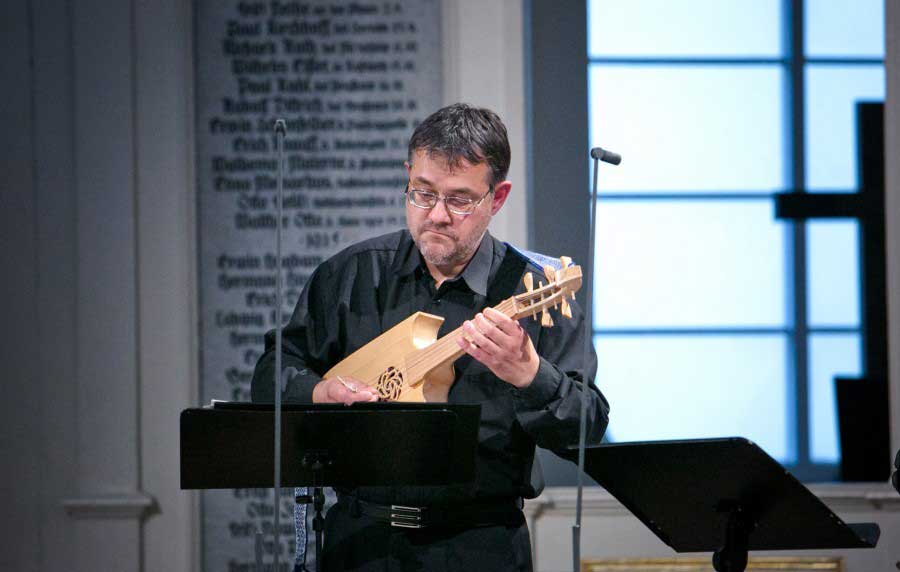Anniversary edition of Wratislavia Cantans will be celebrated with the performance of songs that once accompanied all important events in the life of Wrocław residents in the past. These pieces were issued by city publishing houses in the times of when House of Habsburg was in power. Joyous compositions with effective instrumentalisation will set a festive mood among the audience.
Lively dances and joyful songs always accompanied the most important events in lives of German patricians and wealthy members of Polish minority in Wrocław. Engagement and christening parties, name days and successfully done businesses were celebrated with the sounds of music. Protestant families had a habit of singing and playing together. In less joyous circumstances, sung prayers were performed for example in the effort to protect the town from plague or safeguard it from Turkish aggression. Urban celebrations and church ceremonies also required a properly selected music score. Four-voice choir performed with a rich set of instruments, including, among others, bombards (loud wind instruments), flutes, violas, lutes, and harpsichord.
Wrocław musicians composed, and city publishing houses made money from printing sheet musics. The scores were collected in church libraries and by wealthy city folk. After many years, the scores, as musical objects of historical value, were placed in the City Library established in the 19th century, and today they can be found in Wrocław University Library located on the Wyspa Piasek island.
Tomasz Dobrzański and a group which he created — Ars Cantus (which means 'the art of singing') work hard to discover musical treasures collected in the library. Ars Cantus ensemble formed in the year 2000 specialises in bringing the music of Lower Silesia back to life — the artists reach back even to pieces from the 14th century. Thanks to the ensemble, numerous musical pieces were performed for the first time in hundreds of years. For the album with recorded music based on the scores from Wrocław University Library, Ars Cantus was nominated for the Fryderyk award and received the Wrocław Musical Award.

Des Königs von Polen tantz and Tripla No. 81 (ed. Bartolomaeus i Paul Hessen, Etlicher gutter Teutscher und Polnischen Tentz..., Wrocław, 1555)
Samuel Besler, 1611 In te magna tuis spes
Gregor Lange, 1585 Viel Grosse Sünd
Morning song – Jesus Christ, Almighty Lord (1573)
Monogramist M.K., 1604 O Jhesu Christ Emanuel
Simon Besler, 1615 Cantio Votiva. Pro Incremento et Conservatione Piarum Scholarum 4. Voc. Concinnata, et Juventuti Musices Studiosae donata. Breslae, Typis Baumanianis, 1615
Batalia (ed. Bartolomaeus i Paul Hessen, Viel feiner Lieblicher Stücklein…, Wrocław, ok. 1555)
Bartholomeus Rothmann, 1619 Dir jauchzend froehlich dancken wir
Untitled dance No. 12 (Etlicher gutter Teutscher und Polnischen Tentz...)
Nicolaus Zangius (Wrocław, 1606) Tota pulchra es amica mea
Anonymous (Wrocław, 1674) Ists nichsts ein verkehrtes thun... (Der besiegte Jungferkranz...)
Pastorum Tantz (Viel feiner Lieblicher Stücklein…)
Simon Lyra (Wrocław, 1580) Ex patre virtutem didicit
Untitled dance No. 97 (Etlicher gutter Teutscher und Polnischen Tentz...)
Gregor Lange (Wrocław, 1584) Tres Charites Musaeque – Sis foelix pietasque
Ambrosius Profe (Wrocław, 1634) Die Gütte dess Herren, motet à 6
The concert is accompanied by an exhibition of the Wrocław University Library musical collection
Tomasz Dobrzański – flute, artistic direction
Ars Cantus
